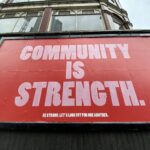Editor’s Note: Our guest contributor is a friend and colleague from the world of leader development and transitions. Rob Sheehan is a Volunteer Blog Editor of Insights With Impact and Academic Director of the Executive MBA Programs at the Robert H. Smith School of Business at the University of Maryland. He shares his experience in learning how to strive to be an anti-racist white ally.
Recently I was asked by the Racial Justice ministry at my church to co-facilitate a Book Group. Fortunately for me, I said yes, as it turned out to be a great learning experience.
My co-facilitator for the Book Group (Milli) suggested the book, I’m Still Here: Black Dignity in a World Made for Whiteness. It is an excellent book and I strongly recommend that you read it. I am grateful to Milli for suggesting it and for structuring our Book Group meetings. It was very fulfilling to be her accomplice for this project.
The book tells the life story (so far; she is still fairly young) of the author, Austin Channing Brown, an African-American woman. Wait – a woman named Austin? Yes – and that is an early part of the story.
When Austin was seven, her mother told her that she and her father had named her Austin so future potential employers would think she was a white man, and she would not be discriminated against. And the story goes on. It is a very personal story in which she authentically shares her life experiences and feelings.
Recently I saw this quote by Isabel Wilkerson, author of the book Caste: The Origins of our Discontents:
“Radical empathy, on the other hand, means putting in the work to educate oneself and to listen with a humble heart to understand another’s experience from their perspective, not as we imagine we would feel.”
Our world needs more “radical empathy.” Black lives matter (check this link for my blog on that topic). And white people need to better understand our Black brothers and sisters if we are going to create real community – a world that works for everyone with no one left out. Reading books like I’m Still Here is a good start to developing that kind of empathy.
But it is just a start. I am reminded of an article in The Washington Post from two years ago, just after George Floyd was murdered: “When black people are in pain, white people just join book clubs.”
We need to make sure that we are not JUST joining Book Clubs.
In the church book group, my co-facilitator, Milli, shared a Venn Diagram with us that compared/contrasted: Allies, Accomplices, and Saviors – which is taken from this article.
Saviors make the mistake of putting themselves in the center of the conversation.
Allies provide quiet support.
Accomplices provide vocal advocacy – and are willing to pay the price for doing so.
This is a nice framework that reminds me that – when I engage issues of Diversity, Equity, and Inclusion (DEI) – this is not about me. I want to be careful to not fall into a Savior mentality.
And I want to look for ways I can be an Ally and Accomplice. If you feel the same way, here are some suggestions that I have been working to follow:
*Start where you are. Investigate and learn what is happening regarding DEI in your world – your workplace, your community, your children’s school, or your place of worship.
*Reach out. Once informed, contact people in your world who are working on DEI issues and offer your active involvement.
*Show up. There are likely opportunities for you to attend programs and activities connected to DEI initiatives. Just showing up is a good first step. At one of these programs I attended, a young African-American woman said to me: “It is great that you are here. As an older, white guy you really don’t have to get involved with this if you don’t want to.” She was right that we white folks don’t “have to” show up for these programs – which makes it even more impactful when we do. We may not “have to” but we “need to” if we are going to promote change.
*Speak up. Maybe you see something that needs to change or something that is clearly very wrong. Use your voice. This is where you start making the transition from Ally to Accomplice. Check out this blog for some suggestions on giving Voice to your Values.
Finally, be persistent. Keep reading and learning. Keep reaching out, showing up, and speaking up. The journey for Justice is a long one. But there are many other Allies and Accomplices who will support you on the way.




Thx for mentioning Isabel Wilkerson’s Caste.
Pax Christi suggests a three prong approach: pray, study, and act. I try to practice that…
Thnaks Sally for the shout out for Caste. A clear and compelling book. And for keep it simple.
Peace,
Tom